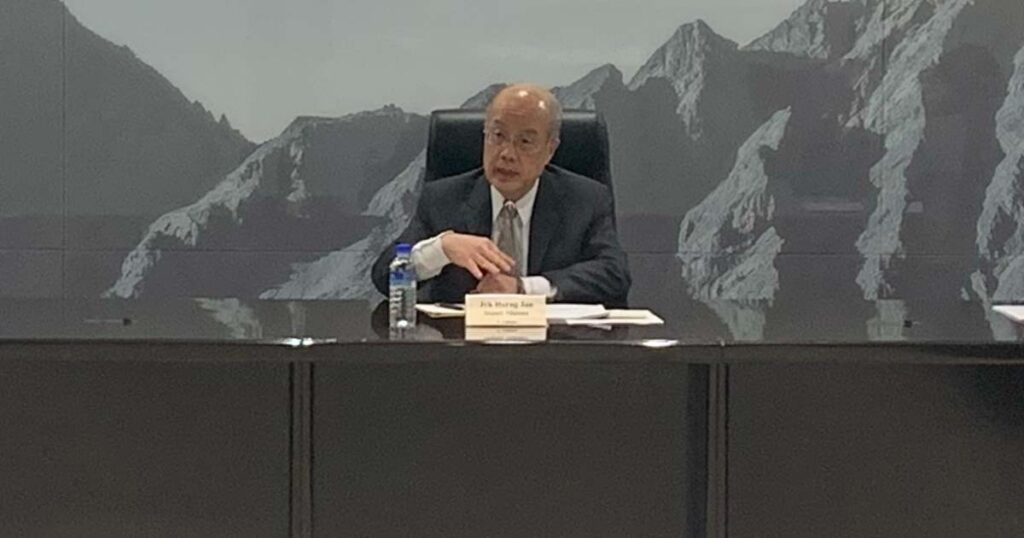TAIPEI––From illegal election gambling operations to stealing opposition talking points, senior Taiwanese officials and cyber security experts have sounded the alarm on China’s information campaigns being conducted in the lead up to the 2024 Taiwanese presidential election.
Taiwan’s deputy minister of mainland affairs, the administrative agency responsible for coordinating affairs with China, Jyh-Horng Jan, alleged on Tuesday that one of China’s “classic tactics” when it comes to election interference is to pay underground bookmakers to place highly skewed odds on failing candidates and provide Taiwanese people with large cash payouts if China’s preferred candidate wins.

As gambling is illegal in the Taiwanese constitution, China seeks to take advantage of this by working with underground bookies to incentivize betting by tweaking odds on candidates that Beijing views as friendly as Jan explained. Once people wager on candidates that China views as friendly, “more people will flock to support that candidate.”
“Now we have a candidate who is trailing in the polls and therefore stands very little chance to win an election,” Jan told reporters in what appears to be a reference to Kuomintang (KMT) presidential candidate Hou You-yi. “In this case, Beijing would work with election operators telling them that if you can get more people to wager on this candidate then the people who bet on this candidate will be able to win very high cash rewards.”
“This is a very classic tactic to China’s election interference. When it comes down to where this money comes from, obviously it comes from Beijing,” Jan said.
According to local media reports, in an effort to crack down on illegal election gambling operations during this election cycle, Taiwan officials are offering citizens up to CAD $426,000 for information on gambling operations linked to foreign sources.
Taiwan’s current vice president and leading contender to succeed outgoing president Tsai Ing-wen in January of 2024 is the Democratic Progressive Party (DPP) candidate Lai Ching-te. Behind Lai in the polls is Taiwan People’s Party (TPP) candidate Ko Wen-je who finds himself in second place in front of KMT candidate Hou You-yi according to polling conducted in July.
The KMT, despite being the original ruling party in Taiwan during the authoritarian dictatorship of Chiang Kei-shek after the Chinese civil war, is the party that favours a softer approach to cross-strait relations and advocates more collaboration with mainland China.
On the other side, the incumbent DPP takes a stronger approach against China through policies such as increasing the length of mandatory military service for all men to one year and continuing to build up national defence capabilities against the increasing threat of invasion posed by China.
“The major theme of China’s influence campaign in this upcoming election is a choice between peace and war,” cyber security expert and research fellow at Taiwan’s Institute for National Defense and Security Research Yi-Suo Tzeng said Monday.
According to Tzeng, China wants Taiwanese voters to feel that “if you vote for the DPP, then you choose war.”
Another approach that China takes to interfere in Taiwanese politics according to Tzeng is for Beijing to steal talking points from Taiwan’s domestic opposition.
“Usually Beijing will steal what our domestic opposition party politicians say, their statements and their narratives and make a twist and spread it to create confusion. To make Taiwanese people think that our own people are the local collaborators of Beijing.
This influence campaign is one part of what Tzeng describes as China’s “hybrid threat method” approach to influencing Taiwan’s upcoming election.
When the pure narrative approach is not working as Tzeng explained, China, as part of its “hybrid threat method” will collaborate with the military by conducting airspace incursions, military drills in the Strait and cyber attacks on Taiwan during an election.
“Usually, if China has done everything before the election, as time approaches closer to election day, they will tone down the intensity of military activities and military harassment. This time will probably be different,” Zhang said.
Deputy Minister Jan also explained two other methods that China is employing as part of their information campaigns to influence the outcome of the upcoming Taiwanese election.
According to Jan, China will release statements through Taiwanese business associations that represent those with financial interests in China that the Communist government is opposed to certain candidates.
“By doing this,” Jan said, “they want to shape this image that Taiwanese people are expressing opposition to certain candidates where it is actually (the CCP’s) voice.”
Jan also said that another method utilised by China to shape public opinion in Taiwan is through “a handful” of wives working for the United Front Workers Department married to Taiwanese men living in Taiwan.
“There are around 350,000 cross-strait married couples and among those over 250,000 of them are with a female mainland Chinese spouse living in Taiwan. A handful of them would be utilised by the United Front Workers Department to interfere with our activities in Taiwan or to voice opinions on behalf of the CCP.”
Jan continued, “In Canada, there are a lot of Chinese immigrants so China is also going to wage very similar tactics.”
Editor’s note: Harrison Faulkner’s travel to Taiwan was arranged and funded by the Taipei Economic and Cultural Office (TECO). However, all coverage is independent and not subject to review or direction by TECO.

